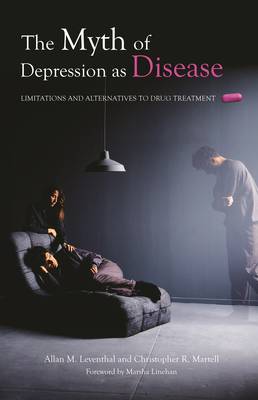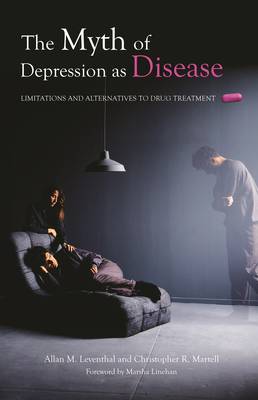
- Afhalen na 1 uur in een winkel met voorraad
- Gratis thuislevering in België vanaf € 30
- Ruim aanbod met 7 miljoen producten
- Afhalen na 1 uur in een winkel met voorraad
- Gratis thuislevering in België vanaf € 30
- Ruim aanbod met 7 miljoen producten
Zoeken
The Myth of Depression as Disease
Limitations and Alternatives to Drug Treatment
Allan Leventhal, Christophe Martell
€ 81,45
+ 162 punten
Omschrijving
Depression is commonly thought of as a biological disorder best treated with antidepressant medications. Pharmaceutical companies and many experts promote this view as established in scientific fact. Here, Leventhal and Martell argue that there is scant actual scientific evidence for this view, and that the issue is open to considerable question. They maintain that there is very little known-they call the evidence woefully weak-regarding the role of biology in depression. Marketing by drug producers has not only led the public to accept dubious claims and over-value antidepressants, but has also led medical doctors to prescribe them excessively. Leventhal and Martell argue that the effectiveness of psychological therapy has strong scientific support in the treatment of anxiety and depression, and it is safer and results in less frequent relapse. This book will help consumers decide which treatment is best for them. It includes a list of questions to ask before accepting a prescription for antidepressant medication.
Readers will find this book helpful in understanding the controversy surrounding the widespread prescription and use of antidepressants. It traces the history and science behind the pharmaceutical treatment of depression, and it presents, in accessible language, information that will empower readers to make the best choices possible regarding the treatment of their own or their loved ones$$$apos$$$ feelings of depression and anxiety. The audience for this book includes those who are depressed and considering professional help, those concerned about health care and the services offered in the mental health field, and doctors or mental health professionals who may wish to reconsider the basis for treatments they are recommending to patients. Students and scholars in psychology, clinical psychology, public health, social work, and psychiatry will also find this of interest.
Readers will find this book helpful in understanding the controversy surrounding the widespread prescription and use of antidepressants. It traces the history and science behind the pharmaceutical treatment of depression, and it presents, in accessible language, information that will empower readers to make the best choices possible regarding the treatment of their own or their loved ones$$$apos$$$ feelings of depression and anxiety. The audience for this book includes those who are depressed and considering professional help, those concerned about health care and the services offered in the mental health field, and doctors or mental health professionals who may wish to reconsider the basis for treatments they are recommending to patients. Students and scholars in psychology, clinical psychology, public health, social work, and psychiatry will also find this of interest.
Specificaties
Betrokkenen
- Auteur(s):
- Uitgeverij:
Inhoud
- Aantal bladzijden:
- 200
- Taal:
- Engels
- Reeks:
Eigenschappen
- Productcode (EAN):
- 9780275989767
- Verschijningsdatum:
- 1/12/2005
- Uitvoering:
- Hardcover
- Formaat:
- Ongenaaid / garenloos gebonden
- Afmetingen:
- 162 mm x 238 mm
- Gewicht:
- 458 g

Alleen bij Standaard Boekhandel
+ 162 punten op je klantenkaart van Standaard Boekhandel
Beoordelingen
We publiceren alleen reviews die voldoen aan de voorwaarden voor reviews. Bekijk onze voorwaarden voor reviews.











